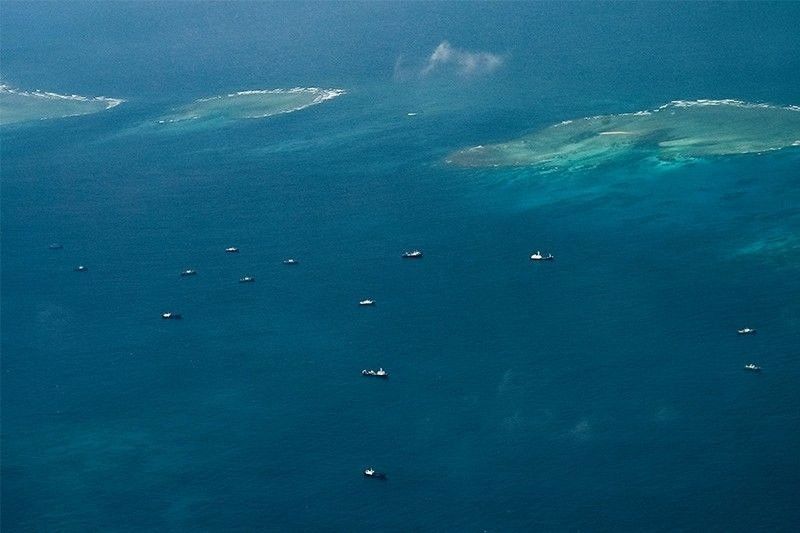More than a nuisance: Dredging activities in WPS threaten both economy, security

On at least four separate occasions this year, coastal communities in Zambales and Bataan reported sightings of dredging activities.
In March, it was confirmed that at least 14 dredging vessels with Chinese crew members have been operating off the coastal town of San Felipe in Zambales. The dredging activities started in October 2023 with only two to three vessels – at first. But by January 2024, operations have ramped up to 24/7, at times with up to 20 vessels operating at a time.
Residents said the dredging was a nuisance.
In May, the Philippine Coast Guard (PCG) detained a Sierra Leone-registered ship with Chinese crew on board. The ship, the MT Hyperline 988, was found to have entered the Philippines illegally, pretending to carry the Philippine flag in Zambales province. The PCG detained the ship and the crew for lack of the following documents: crew list, passports, and seaman's books.
In November, the PCG discovered 13 undocumented Chinese nationals on a dredging vessel in Bataan, along with a People’s Liberation Army uniform similar to those found in illegal POGO hubs.
And then, just a few days ago, on December 10, San Felipe residents saw a China Coast Guard ship, detected via marine tracker near a dredging site in Zambales. This incident prompted a PCG inspection of the area.
What these dredging activities mean will not be too difficult to guess.
Zambales and Bataan are coastal provinces, and both are critical entryways to the West Philippine Sea. Indeed, the presence of Chinese-operated vessels and Chinese nationals betrays some longer-term, sinister motive. Allegations of illegal entry, undocumented workers, and covert espionage activities undermine our economic and national security.
Foremost, dredging activities harm the environment. They disrupt marine ecosystems and affect fisheries. These are a vital source of income for coastal communities.
Furthermore, the fisheries sector employs about 1.4% of the country’s labor force. The sector also contributes 1.3% of the Philippines’ gross domestic product. Thus, the effect is not only on individual fishermen or communities but on the economy.
This is a time when we should be focusing on creating jobs. According to a Social Weather Stations survey, 39% of Filipinos believe that job creation and livelihood generation should be top priorities for senatorial candidates.
This underscores the need for policies supporting job opportunities for Filipinos. Any development that does the opposite – specifically stripping our people of opportunities to earn a living, endangering their economic security in the process – must be thumbed down and viewed with suspicion. Especially if they are foreign interests infringing into our own legal waters.
The harmful effects of Chinese dredging activities are compounded by their presence’s serious threat to our national security.
Over the past few months, we have gained a sense of the audacity with which Chinese interests have slipped through the not-so-watchful eye of our authorities, with some of our own Filipino officials conniving with and likely profiting from these activities.
This is not just because the Chinese find the Philippines a nice place to visit. No – they have had geopolitical designs all along and have been using a combination of tactics to penetrate our porous systems. This is why they have been able to slip their own spies and even install them as local government officials, gain permits to build POGOs, and operate from the halls of power.
China’s construction of artificial islands and military installations in the West Philippine Sea has already raised alarms about its growing militarization of the region. The involvement of Chinese nationals in dredging activities could be a part of a broader Chinese strategy.
The increasing Chinese presence in sensitive areas such as our Philippine waters adds a layer of complexity to the already contentious issue of foreign influence and control, not only over our natural resources but in all aspects of our life including our critical infrastructure, information systems, and the like.
There are still a number of flagship infrastructure projects in the pipeline including the Dredging of Northwestern Mindanao Clustered Project, San Andres Port Rehabilitation Project, Laguna Lakeshore Road Network, the Road Widening of Maharlika Highway (Lanao-Pagadian-Zamboanga City Road) Project, and the Bataraza Port Expansion Project in Palawan.
As before, there is high likelihood that malign contractors would want to participate in these projects. We need to learn from our lessons in the past.
When infrastructure projects were awarded to Chinese contractors in the previous years, jobs that were supposed to be for the Filipino people were given to Chinese construction workers. There were also reports of destruction to the environment and, of course, the national security concerns that came with the increasing number of Chinese presence in the country, amid China’s continuous aggressive and coercive actions in the West Philippine Sea.
Furthermore, a Pulse Asia survey in September 2024 revealed that 99% of Filipinos express distrust toward China. This reflects the strong desire of the Filipino people to resist foreign influence and stand firm in defense of our sovereignty.
Given these realities, it is crucial to watch developments in our coastal communities closely. Dredging activities and the increasing presence of Chinese nationals not only pose a grave threat to our sovereignty but also directly impact ordinary citizens.
Fisherfolk are being deprived of their livelihood as fish stocks decline, driving up the cost of seafood for consumers. Local communities lose economic opportunities, and the ripple effects extend to all of us as access to affordable, sustainable resources becomes more strained.
The Chinese presence along our coasts is not merely a nuisance; it is a serious and deliberate challenge to our national integrity. To simply sit idly and not say a word would be capitulating to the hegemonic intent of a regional bully.
Lawyer Karry Sison is a co-convenor of Bantay Konsyumer, Kalsada, Kuryente (BK3).
- Latest




























